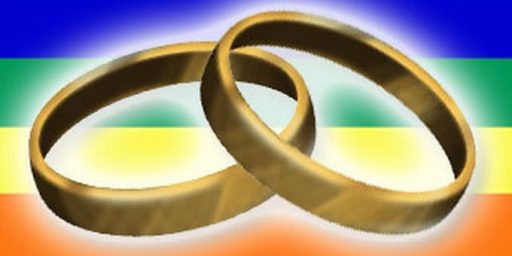The Values Vote Myth
David Brooks [RSS] has pretty much the same reaction to the “gay marriage decided the election” meme as I did:
Every election year, we in the commentariat come up with a story line to explain the result, and the story line has to have two features. First, it has to be completely wrong. Second, it has to reassure liberals that they are morally superior to the people who just defeated them. In past years, the story line has involved Angry White Males, or Willie Horton-bashing racists. This year, the official story is that throngs of homophobic, Red America values-voters surged to the polls to put George Bush over the top. This theory certainly flatters liberals, and it is certainly wrong.
Here are the facts. As Andrew Kohut of the Pew Research Center points out, there was no disproportionate surge in the evangelical vote this year. Evangelicals made up the same share of the electorate this year as they did in 2000. There was no increase in the percentage of voters who are pro-life. Sixteen percent of voters said abortions should be illegal in all circumstances. There was no increase in the percentage of voters who say they pray daily. It’s true that Bush did get a few more evangelicals to vote Republican, but Kohut, whose final poll nailed the election result dead-on, reminds us that public opinion on gay issues over all has been moving leftward over the years. Majorities oppose gay marriage, but in the exit polls Tuesday, 25 percent of the voters supported gay marriage and 35 percent of voters supported civil unions. There is a big middle on gay rights issues, as there is on most social issues.
Paul Freedman, a UVA professor writing at Slate, says simply, “Gay marriage and values didn’t decide this election. Terrorism did.”
The evidence that having a gay-marriage ban on the ballot increased voter turnout is spotty. Marriage-ban states did see higher turnout than states without such measures. They also saw higher increases in turnout compared with four years ago. But these differences are relatively small. Based on preliminary turnout estimates, 59.5 percent of the eligible voting population turned out in marriage-ban states, whereas 59.1 percent turned out elsewhere. This is a microscopic gap when compared to other factors. For example, turnout in battleground states was more than 7.5 points higher than it was in less-competitive states, and it increased much more over 2000 as well.
It’s true that states with bans on the ballot voted for Bush at higher rates than other states. His vote share averaged 7 points higher in gay-marriage-banning states than in other states (57.9 vs. 50.9). But four years ago, when same-sex marriage was but a twinkle in the eye of the Massachusetts Supreme Judicial Court, Bush’s vote share was 7.3 points higher in these same states than in other states. In other words, by a statistically insignificant margin, putting gay marriage on the ballot actually reduced the degree to which Bush’s vote share in the affected states exceeded his vote share elsewhere.
Why did states with gay-marriage ballot measures vote so heavily for Bush? Because such measures don’t appear on state ballots randomly. Opponents of gay marriage concentrate their efforts in states that are most hospitable to a ban and are most likely to vote for Bush even without such a ballot measure. A state’s history of voting for Bush is more likely to lead to an anti-gay-marriage measure on that state’s ballot than the other way around.
The answer to this question, really, depends on how it is asked. As I’ve noted before, in an election decided by three percentage points, any number of single factors could be said to be “decisive” in the sense that, if people partially motivated by a particular viewpoint had not voted, their candidate would have lost. Indeed, by the logic that gay marriage decided the election, so did abortion. Or tax policy. But this campaign was waged almost entirely on the Iraq War, terrorism, and personal character. It would seem more fitting, then, to say that it was those issues upon which the race turned.
Kevin Drum agrees, although he adds an important qualifier:
I suspect cultural issues are more important than [Freedman]’s giving them credit for. After all, even if they haven’t become any more important than they were in 2000, they’re still important — and Democrats need to figure out a way to reduce their impact.
Andrew Sullivan, after a couple days of distress over the possibility that anti-gay sentiment was the deciding issue of the campaign, breathes a sigh of relief and adds his endorsement to Brooks’ explanation.






About “values” voters: maybe those obscenity-laced celebrity fundraisers damaged Kerry with these voters? No one seems to remember those.
Democrats need to figure out a way to reduce their impact.
I have a suggestion, but I rather doubt it’s the same as Mr. Drum’s.
Exactly, McGehee. Drum’s response is very telling: It’s not, “let’s figure out a way to adjust our policy proposals to be a better fit for this large number of voters, thereby increasing our saleability to them.” No, it’s “Democrats need to figure out a way to reduce their impact.”